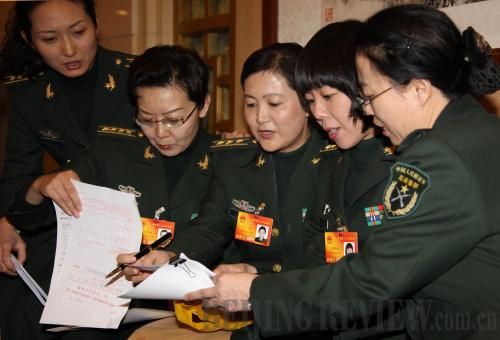|
 |
|
AT WORK: Deputies from the People's Liberation Army talk about the motion on the Blood Donation Law on March 7, 2010 (WANG JIANMIN) |
Snowflakes were dancing in Beijing. Several women, dressed in colorful clothes, appeared overly jovial for the wintry weather. They were women deputies on their way to the Third Session of the 11th National People's Congress (NPC) on the morning of March 8, 2010. They had dressed up to celebrate the 100th anniversary of the International Women's Day.
At lunch, women deputies from Jiangxi Province were pleasantly surprised by the red roses placed on their seats. Their fellow male deputies meanwhile displayed unusual chivalry.
"For years, I celebrated the International Women's Day in Beijing while attending the NPC meeting. This is a special way to celebrate the holiday. I feel special and honored," Li Miaojuan, a deputy from Guangdong Province told Nanfang Daily. Guangdong is one of the richest provinces in China, and Li heads the provincial research and development commission.
Women deputies were convenient targets for journalists hunting for stories. These deputies, from different walks of life and different regions, invariably symbolize women's say in national affairs.
The NPC Women
The NPC is China's top legislature. The NPC and its permanent body, the Standing Committee, jointly enact laws. Official statistics show, 638 women deputies were elected to the 11th NPC, representing 21.4 percent of the total. Currently, a total of 4,752 women, or 23.35 percent of the total deputies serve at the provincial people's congresses.
There are 26 females in the NPC Standing Committee, accounting for 16.15 percent. Among the 13 vice chairpersons of the 11th NPC, three are women. They are Uyunqimg, Chen Zhili and Yan Junqi.
Uyunqimg is an ethnic Mongolian. In the early 1960s, she studied political economy in the Party School of Inner Mongolia Autonomous Region, and became a teacher in that school after graduation. She has worked for Baotou Daily, the CPC Baotou City Committee, and the CPC Inner Mongolia Regional Committee, heading the publicity department of the committees at different times. She was Chairwoman of Inner Mongolia Regional People's Government, and elected Vice Chairwoman of the 10th and 11th NPC Standing Committees in 2003 and 2008 respectively.
Chen did research in physics for many years at Shanghai Institute of Silicate of the Chinese Academy of Sciences (CAS), with two years in the University of Pennsylvania as a visiting scholar. She held various positions on the CPC Shanghai Municipal Committee and served as the Minister of Education from 1998 to 2003. She became a State Councilor in 2003. In 2008, Chen was elected as Vice Chairwoman of the 11th NPC, and the Chairwoman of the All-China Women's Federation.
Yan gained a master's degree at Shanghai Jiaotong University (SJTU). In 1991, Yan received a PhD in engineering from a university in Denmark, and taught there. She returned to SJTU in 1995 and worked as the assistant to its president. In the late 1990s and early 2000s, she served on the Shanghai Municipal Committee of China Association for Promoting Democracy (CAPD), later becoming its chairwoman. In 2008, she became Vice Chairwoman of the 11th NPC.
Hong Tianhui, the 11th NPC deputy and Vice Chairwoman of the All-China Women's Federation, said that percentage of women NPC deputies was still quite low, especially in light of the percentage of women in the population.
In the past three decades, the percentage of women in the NPC has lingered a little over 20 percent.
A newly passed amendment to the Electoral Law of the National People's Congress and Local People's Congresses of the People's Republic of China says women's representation in the people's congresses should be ensured, and the percentage of women should be increased.
Women in politics
Women's positions in China have risen significantly in the past few decades, Chen said when talking to netizens on March 2. A survey administered last year by the Guangdong Provincial Women's Federation revealed that participating in politics is among the top 10 desires of women.
In addition to the three NPC vice chairwomen, there are five female state or CPC leaders at the Central Government, including State Councilor Liu Yandong and four vice chairwomen of the Chinese People's Political Consultative Conference. Three female ministers under the State Council are also famous for their role in the government.
The All-China Women's Federation recently launched research on how high-caliber women talents became successful, so as to help women to break the glass ceiling in working places. Chen called for policy support to women, as a compensation for women's special contribution to the society. | 